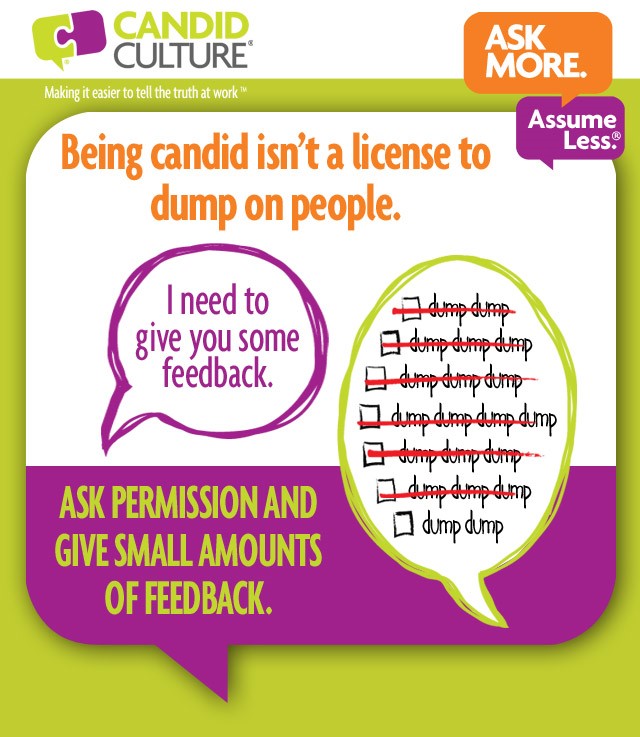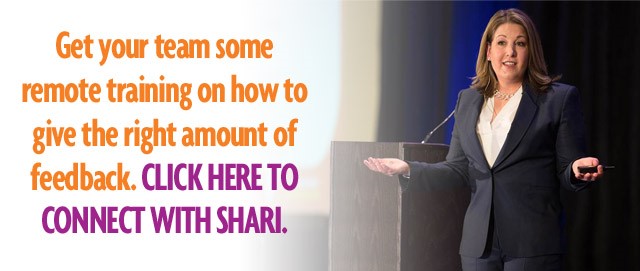Giving Feedback – Less is More
People leave feedback training armed with new skills and they unfortunately sometimes use those skills as a weapon. It goes something like this, “I need to have a candid conversation with you.” And then the person proceeds to dump, dump, dump. This couldn’t be more wrong, wrong, wrong.
When you give someone negative feedback you are essentially telling him that he did something wrong. And who likes to be wrong? The ego gets bruised and people often start to question themselves. This normal reaction doesn’t mean you shouldn’t give feedback, you just need to do it judiciously.

Ask yourself these four questions when deciding whether or not to give someone feedback:
- Do I have the relationship to provide feedback? Does the recipient trust me and my motives?
- Do I have permission to give feedback? If the recipient doesn’t work for you, you need permission to give feedback.
- Is this something the person can do something about? If it’s not a change the recipient can make, keep your thoughts to yourself.
- Is the feedback helpful? Ultimately the purpose of all feedback is to be helpful.
Let’s say you’re on the receiving end of too much feedback. What should you do? It’s ok to say “no thank you” to feedback. Here’s what you could say:
“Thank you for taking the time to bring this to my attention. I really appreciate it. You’ve given me a lot of feedback today. I’d like something to focus on that I can impact right now. What’s the most important thing I should do?” You’ve validated the other person and demonstrated openness and interest. You’ve also set some boundaries and expectations of what you will and won’t do.
“Thank you for taking the time to share your requests about… We won’t be making any changes to that and here’s why.” It’s ok not to act on all feedback, simply tell people why you won’t.
“I appreciate your concern. I’m not looking for feedback on that right now.” Can you say that to someone? Yes. Should you? Sometimes. To your boss – no. To someone who offers unsolicited advice that’s outside of their lane, yes. They’ll get the message.
People can only act on and digest small amounts of feedback at a time. Be judicious and assess your motives. The purpose of feedback is to be helpful, when the feedback is requested and when you have the relationship to give it.
If you receive too much feedback or unsolicited feedback, it’s ok to decline. You’re not the 7-11, aka you’re not always open.

Tags: being candid, business communication, give feedback, give the right amount of feedback, remote training, small amounts of feedback







Shari, I really appreciate these bits of advice, they are very helpful. I think for many of the “talking points” are of most help, wording your thoughts is very important and sometimes tough…or just mind blocking. Your opening conversations are one of my favorite parts of your blog.
Working for a large corporation I had a manager, of 15 years, who had to be terminated after many chances to correct his problems. The company division HR manager came to town to help out and I was amazed how he handled the termination…the manager being terminated actually was thanking us as he went out the door, it was just amazing how the language the HR director used worked to not only get the point across but “sooth” the moment.